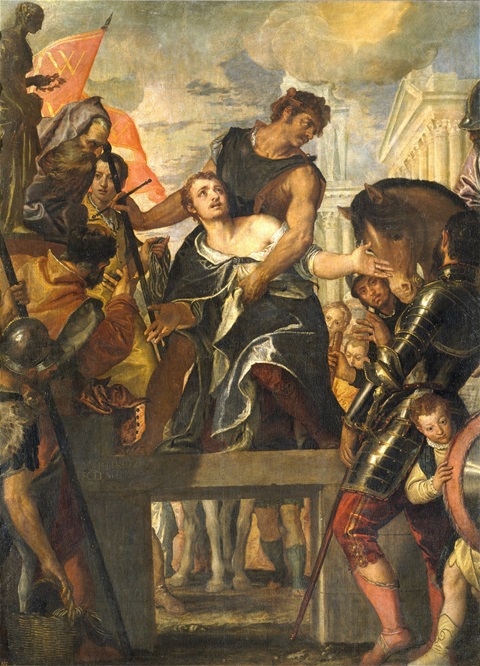November 11, 2018: ST. MENNAS
November 11, 2018: COMMEMORATION OF ST. MENNAS, MARTYR
“And I say to you, whosoever shall
confess me before men, him shall the son of man also confess before the Angels of God.”
(St. Luke, xii. 8)
Prayer (Collect).
Grant, we beseech thee, O Almighty God that we, who celebrate the festival of blessed Mennas, thy Martyr, may by his intercession, be strengthened in the love of thy name. Through our Lord Jesus Christ, thy Son, who liveth and reigneth with thee, in the unity of the Holy Ghost, God, world without end. Amen.
The soldier Mennas was a native of Egypt, and after his martyrdom became the protector of Alexandria. It is not a rare thing to find, even at this date, phials formerly brought by pilgrims to be filled with oil from the lamp burning before his tomb.
Mennas was an Egyptian, but a soldier in the Roman army. He professed Christianity. He was at Cotyӕus in Phrygia when the edicts of persecution in the army were published by Diocletian and Maximian in 298. He abandoned the army thereupon, and retired into a solitary place with some other Christians, to escape the rage of the persecutor. There he remained till the general persecution in 303, when, filled with enthusiasm, and burning with desire of martyrdom, he went back to Cotyӕus, and entering the theatre, where the people were seeing a martyrs’ exhibition, he cried at the top of his voice, “I am found of them that sought me not.” (Isaias, lxv. 1) All eyes were turned on him. Pyrrhus, the president, sent for him and questioned him, and he said he was a Christian. Thereupon he was consigned to prison. Next day he was scourged. When the soil was red with his blood one of those present urged him to give way. He replied, “Retire, miserable one; I have always sacrificed to my God, and to Him alone will I offer sacrifice. These torments are not insupportable. Nay, rather I rejoice in them.” The judge then ordered his sides to be torn with iron hooks, and the wounds to be fretted with horsehair cloth. Finally, wearied with tormenting him, the judge ordered him to be burned alive.
Some Christians succeeded in recovering the bones from among the ashes of the pyre, and they were carried, as he had requested, to be laid in his native land, at Alexandria in Egypt. A basilica was erected over his remains as soon as Constantine gave peace to the Church. Timothy, patriarch of Alexandria (380—385), relates some of the miracles wrought by the saint, some grotesque in their marvellousness.
A traveller, intending to visit the church of S. Mennas, and make an offering at his tomb, lodged for the night in a tavern. The innkeeper, seeing he had a large portmanteau, murdered the man in the night, cut him up, packed his limbs in a sack, and hung up his head to a beam of the roof, intending to take his money and throw the body into the water at the earliest opportunity. But S. Mennas rode up to the inn door, attended by many saints, put the bits of the man together, restored him to life, gave him his port manteau, scolded the taverner, and vanished.
Taken from: The Liturgical Year - Time after Pentecost, Vol. VI, Edition 1903;
The Lives of the Fathers, Martyrs, and Other Principal Saints, Vol. XIII; and
The Divine Office for the use of the Laity, Volume II, 1806.
Also Read – November 11, 2018: St. Martin, Bishop and Confessor.
St. Mennas, pray for us.
